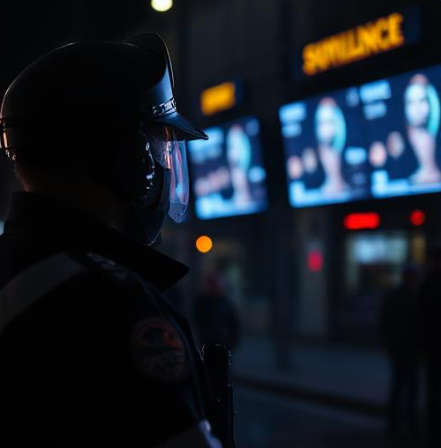
- Surveillance and biometric recognition are turning public spaces into areas of continuous scrutiny
- Biometric identification systems are being deployed in the UK to find dangerous criminals
- Biometric systems always work by considering people scanned as possible suspects
- According to official claims, the captured data is deleted immediately
The insidious proliferation of digital technologies, in particular biometrics and surveillance infrastructure, has been based on the "public safety."
These innovations have never ostensibly improved security and their deployment reveals a persistent tendency towards the control and oppression of ordinary citizens rather than genuine protection.
The expansive use of biometric surveillance, including facial recognition systems, gives rise to the paradox where supposed digital security systems are transforming public spaces into areas of constant scrutiny and social tension.
Biometric recognition in public spaces
In the UK digital surveillance landscape is the expansion of live facial recognition (LFR) technology, a move spearheaded by government agencies seeking to leverage the tool's intended efficiency in identifying high-harm offenders.
Recently, the Greater Manchester Police (GMP), along with seven other police forces, commissioned the deployment of new LFR vans funded by the Home Office.
This initiative follows a government push to use facial recognition technology aimed primarily at people involved in serious criminal conduct, with the stated goal of increasing operational effectiveness.
However, the deployment of LFR in public spaces raises deep concerns beyond its stated intention. These systems work by scanning real-time crowds against custom watch lists - databases containing images of people of interest - by analyzing thousands of faces instantly.
Supposedly erasing data immediately
While advocates emphasize the accuracy and speed of these systems, critics highlight significant issues related to data management, privacy, and civil liberties.
Despite the authorities' assertions that strict protocols exist, including an alleged immediate deletion of data that does not match the entries on the watch list, questions remain remain about the robustness of these safeguards.
Is there really a way to verify that the biometric data of scanned people is not stored?
Continuous scrutiny of biometric data of ordinary and honest citizens, many of whom have no criminal relationship, extends the scope of surveillance far beyond selective enforcement, effectively turning public spaces into areas of omnipresent surveillance.
These systems, instead of fostering a sense of security through social cohesion, incite fear and distrust. Constant vigilance can have a devastating effect on public life, discouraging free expression, gathering, and everyday social interactions.
When citizens perceive that they are under perpetual surveillance - harassed by facial recognition cameras and devices - they may feel helpless and oppressed. This atmosphere of suspicion undermines community ties, replacing trust with suspicion and alienation.
Addressing the true causes of crimes
Moreover, the main objective of these technological deployments seems to be the control and not the well-being of the community.
If the authorities were really trying to ensure public safety by respecting civil rights, their attention would shift from invasive monitoring to community-centered approaches.
Promoting social cohesion and addressing the real root causes of violence and disorder would probably be much more effective strategies.
The ethical implications of biometric surveillance are profound. Data collected through facial recognition can be misused or filtered, exposing people to risks beyond mass scrutiny, including profiling, discrimination or unlawful identification.
Even when protocols exist to remove irrelevant data immediately, the possibility of violations or misuse remains significant, especially given the scale at which these systems operate.
If governments really value the security and dignity of the population, they must prioritize promoting social cohesion, transparency and civil liberties over mere surveillance and control.
Only in this way can they build a genuinely safe and just society, a society based on trust, respect and shared responsibility, rather than on constant fear and scrutiny.

The expansive use of surveillance with facial recognition systems
https://www.gov.uk/government/news/live-facial-recognition-technology-to-catch-high-harm-offenders
https://bigbrotherwatch.org.uk/press-releases/unprecedented-facial-recognition-rollout/
https://reclaimthenet.org/greater-manchester-police-live-facial-recognition-launch-privacy-concerns
https://www.computing.co.uk/news/2025/ai/uk-expands-live-facial-recognition
